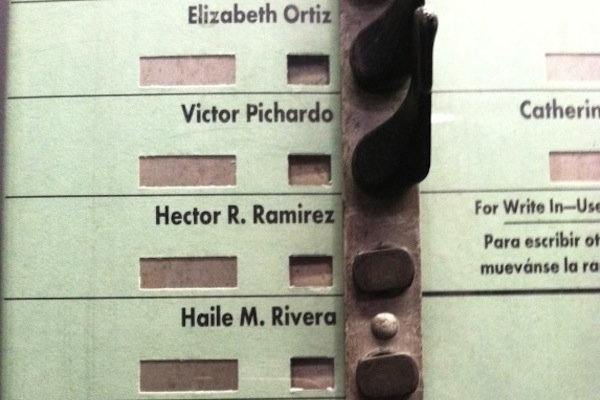
Rachael Levy
Voters at more than one polling place in the 86th district found it a lot easier to vote for the Democratic organization’s candidate, Victor Pichardo, than his challengers last Primary Day. Now the 2013 runner up wants federal oversight of next week’s rematch.
A Democrat running for state Assembly has asked the federal government to deploy election monitors for Tuesday’s primary election because of alleged voting irregularities in the district last year. His opponent supports the call for outside oversight.
Hector Ramirez lost to Victor Pichardo by a mere 72 votes in the seven-way 2013 primary for the 86th Assembly district seat, which had become vacant because of the resignation of Nelson Castro under an agreement with prosecutors. Pichardo had the support of the county Democratic organization and is now the incumbent.
As the Bronx Bureau was first to report last Primary Day, at least one voting machine listed all the candidates for the race but did not have working levers next to the names of some, including Ramirez.
Now facing Pichardo one-on-one, Ramirez claims in a letter sent to the U.S. Attorney’s office that there were problems with multiple voting machines at several polling places. In addition, he alleges that elections inspectors, elected officials, political aides and others allied with Pichardo hung around voting sites intimidating volunteers for other candidates and improperly influencing voters. Ramirez also takes issue with how the city Board of Election conducted the official tally of votes.
For his part, Pichardo said in a statement to CityLimits.org, “Voters deserve all possible protections to ensure a clean and fair election and I welcome any effort to ensure that is the case in the 86th Assembly District this Tuesday.”
After the election, Bronx Democratic chairman Assemblyman Carl Heastie denied there was any skullduggery in the 86th.As Jordan Moss reported here, Heastie suggested that there were problems with voting machines around the city. But Board of Elections spokeswoman Valerie Vasquez said the machine breakdowns were confined to the 86th.
The BOE, however, said all voters who were thwarted by the balky machines were allowed to submit affidavit ballots. Pichardo’s challengers do not believe all did.
City Limits is awaiting comment from the Board of Elections.
Asked why he waited until five days before the primary to seek outside monitoring based on concerns generated by events that occurred last September, Ramirez said via email: “The timing is consistent with the final days of any election in which people are paying the most attention. Five days is a lot of time. All we asking the authorities is to be vigilant.”
Lever machines were taken out of storage for the 2013 primary election because election officials said they couldn’t reprogram the new electronic voting machines in time for a runoff election and general election later in the fall.








